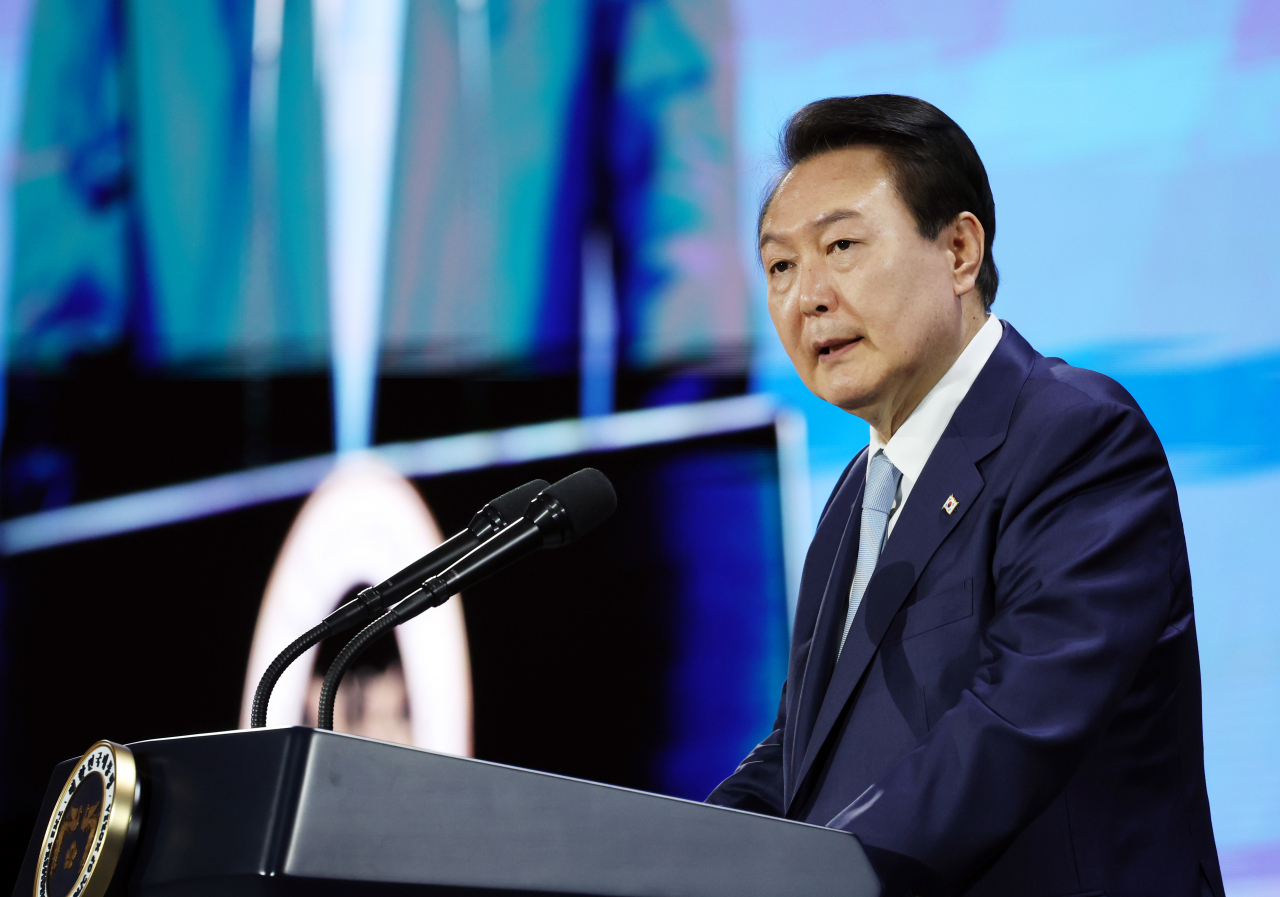Yoon calls for Indo-Pacific solidarity to ride out economic troubles
By Im Eun-byelPublished : May 3, 2023 - 15:47

President Yoon Suk Yeol pledged that Korea will contribute to building cooperative supply chains in the Indo-Pacific region through “partnership and solidarity” during an event held by the Asian Development Bank in Songdo, Incheon, on Wednesday.
"The pandemic has pushed the global economy into tremendous hardship,” Yoon said in his congratulatory address for the ADB’s 56th Annual Meeting of the Board of Governors, citing Russia's invasion of Ukraine and the fragmentation of the global supply network, among other factors.
"These challenges are beyond the competence of any single nation and demand partnership and solidarity between countries,” he said.
The event kicked off Tuesday for a four-day run under the slogan “Rebounding Asia: Recover, Reconnect, and Reform.” It was the first time the event was held face-to-face since the pandemic began.
Yoon also highlighted that South Korea will share its economic development experience with other ADB member states.
"As a key partner with world-class production skills and manufacturing capabilities in semiconductor, secondary cell and bio industries, Korea will actively participate in building cooperative supply chains with Asian nations," Yoon said.
“The Asian region consists of countries with abundant resources, outstanding production and manufacturing capabilities, high technology, excellent human resources,” he said.
"Together with ADB member states, we will walk the path of solidarity for joint prosperity not only in Asia and the Indo-Pacific, but in the world," he said.
Finance Minister Choo Kyung-ho echoed the view, sharing his gratitude towards the ADB.
"Thanks to the support from the ADB and the international community, Korea was able to achieve remarkable growth," Choo said in an opening speech, referring to how Korea has evolved from a recipient country to a donor country in the ADB.
Choo also pointed out the rise of trade protectionism following the pandemic.
“We need to address economic and geopolitical fragmentation and highlight the rules of fair trade once again,” Choo said.
ADB President Masatsugu Asakawa explained the multilateral lender's role in climate finance.
“We know that climate events are causing destruction on a scale never seen before,” Asakawa said. “Our work must always provide for good livelihoods and resilient communities and ensure opportunities.”
As Asakawa said, the ADB organization has been emphasizing the importance of climate action, announcing the launch of the Innovative Finance Facility for Climate in Asia and the Pacific finance program designated to combat climate change and K-Hub, an institution dedicated to climate change studies.
Meanwhile, Bank of Korea Governor Rhee Chang-yong once again stressed it is too early to discuss a transition in monetary policy.
“Though many are questioning when the pivot in the central bank’s monetary tightening policy will come, when high inflation comes under control, then we can move on to think about a pivot,” Rhee said, during the governors’ seminar held later in the day.
Governors of Korea, Indonesia, India and Germany gathered to discuss policies to support Asia’s rebound after the pandemic.
“In the case of Korea, our inflation is going down. The inflation rate in April is lower than 4 percent but core inflation is still around 5 percent,” Rhee said, explaining that inflation remains above the 2 percent target level set by the BOK. Korea’s consumer price index fell to 3.7 percent in April, yet core inflation stood at 4.6 percent.
Rhee also commented that the recent string of bank collapses in the US were well-controlled, describing the US’ response to the crisis to be “an enormous achievement.”
“The current situation seems to be going in the right direction,” he said. He further added the bank crisis has limited impact in Korea due to structural differences.
Rhee assessed the Asian economy is doing “much better” than other regions overall, but that it needs to watch out for the impacts of foreign exchange pressure as the dollar prevails and other currencies remain weak.
Wednesday’s event was followed by the Korea Cultural Concert and the Korea Reception.








![[Graphic News] More Koreans say they plan long-distance trips this year](http://res.heraldm.com/phpwas/restmb_idxmake.php?idx=644&simg=/content/image/2024/04/17/20240417050828_0.gif&u=)
![[KH Explains] Hyundai's full hybrid edge to pay off amid slow transition to pure EVs](http://res.heraldm.com/phpwas/restmb_idxmake.php?idx=644&simg=/content/image/2024/04/18/20240418050645_0.jpg&u=20240419100350)






![[From the Scene] Monks, Buddhists hail return of remains of Buddhas](http://res.heraldm.com/phpwas/restmb_idxmake.php?idx=652&simg=/content/image/2024/04/19/20240419050617_0.jpg&u=20240419175937)

![[KH Explains] Hyundai's full hybrid edge to pay off amid slow transition to pure EVs](http://res.heraldm.com/phpwas/restmb_idxmake.php?idx=652&simg=/content/image/2024/04/18/20240418050645_0.jpg&u=20240419100350)

![[Today’s K-pop] Illit drops debut single remix](http://res.heraldm.com/phpwas/restmb_idxmake.php?idx=642&simg=/content/image/2024/04/19/20240419050612_0.jpg&u=)